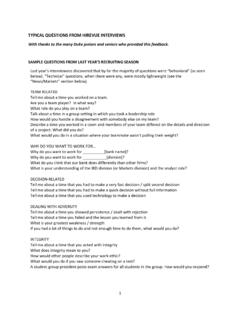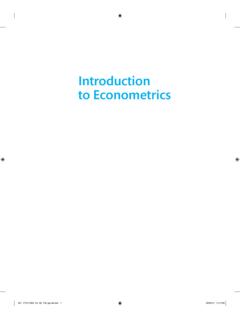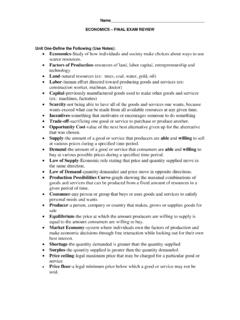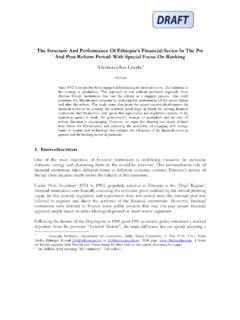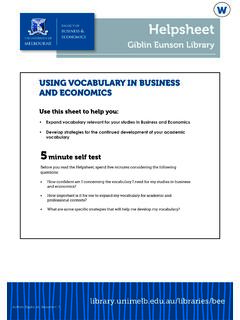Transcription of What is an Investment Bank - Duke University
1 FEP, Duke University 1 Last updated What is an Investment Bank? An Investment Bank raises capital ( money , in the form of debt and equity) for companies and advises them on financing and merger alternatives. Investment banks sell securities (debt and equity) to investors in order to raise the capital. These securities are then traded in the global financial markets. For example: Ford wants to open a new car factory. It requires money to build the factory. An Investment bank will advise Ford on what type of funds to raise, and then go to investors to raise the money . Suppose Ford wanted to buy another car manufacturer, perhaps to increase its exposure to Asia.
2 An Investment bank would evaluate car manufacturers in Asia that Ford might be able to buy. It would then help Ford decide how much to pay, because determining a company s value is complicated. Structure An Investment bank has three distinct areas: i) Front office interacts with clients; ii) Middle office - manages risk and calculates transaction profits and losses; iii) Back office operations and technology. Front-office Investment bank activities (client interactions) are typically broken down into various broad areas: Investment Banking (IBD) Global Capital Markets (GCM) Markets (also called Sales and Trading) Equity Research Private Wealth Management (PWM) The majority of summer intern and full time analyst hiring takes place in IBD and Markets, although GCM groups at some banks have increasingly hired interns and analysts in recent years, and equity research and PWM usually hire a few undergraduates as well.
3 Back Office Operations and technology Middle Office Risk Management and transaction P&L Front Office Client interaction: generates revenue and profits for the bank Investment BANK FEP, Duke University 2 Last updated Investment Banking Division (IBD) This division raises capital for institutions, governments and corporates, by selling either equity or debt. It also provides mergers and acquisition (M&A) advisory, and creates bespoke financing and risk management transactions for clients. In IBD, teams are often separated into industry-focused groups: - Consumer Products & Retail - Energy and Power - financial Institutions - Healthcare - Global Industrial Group - Real Estate - Technology/Media/Telecom - Utilities You might choose to work in an industry group because you have a passion for a particular industry, are motivated to build a toolbox of skills (modeling for M&A, LBOs, IPOs etc), and work for bankers who are focused on building relationships with clients.
4 Teams in IBD are also often divided into product groups: - Global Syndicated Finance - Leveraged Finance - Equity Corp. Fin - Mergers & Acquisitions - Private Equity Placement Group - Debt Capital Markets Group* - Equity Capital Markets Group* * these two groups are often categorized separately as Global Capital Markets (GCM), which straddles Investment banking and the trading floor. You might choose to work in a product group in order to learn some specialized modeling skills such as M&A, LBO, or restructuring. These groups are primarily focused on transactions, leaving the majority of the client relationship management to the industry groups.
5 The key features of an analyst s role involve company valuation, financial analysis (in excel) and compiling pitch books (marketing documents to take to prospective clients). Projects may last anywhere from a few days to several months (or even longer in the case of very large and significant deals). Markets (often referred to as Sales & Trading, Securities, or Global Markets) This is where trading of financial assets takes place. Traders act as market-makers to facilitate client transactions in various product areas such as fixed income, equity, currency and commodity products. Traders make money for the bank by selling securities at a slightly higher price than they pay for them (the bid-ask spread).
6 Trading desks are typically organized by asset class; it is common to find fixed income, currencies and commodities floors combined, while equity trading floors are typically separate. Sales teams provide a critical link between the bank s clients and the market. They facilitate client trading, as well as promoting research analysis to clients. The key to this area is relationship building. Sales teams need in-depth knowledge of their product area, but also need to have a good understanding of economics and how the market works. Some Research also takes place on the trading floor this may either be product research (relating to bond, commodity, or currency products) or macroeconomic research.
7 Research pieces usually include suggest trade recommendations; sales people use this research to further their conversations with clients and discuss relevant trade ideas. This type of research is distinct from Equity Research (see below). FEP, Duke University 3 Last updated Global Capital Markets (GCM) GCM is the capital-raising role, and is something of a hybrid between IBD and Markets. It utilizes skills from both divisions, in that teams have a number of core client relationships (clients in this case being corporates), but are market oriented as it brings deals to market. The timeframe of projects, while typically not as long as in IBD, may last for several days or weeks.
8 For more detailed information about GCM, click HERE. In GCM, teams are also typically divided by product Investment grade debt and leveraged finance on the debt side, or Equity Capital Markets for raising equity. Capital raising on behalf of corporate clients raising money for corporations by issuing debt or equity involves two distinct functions: Origination and Syndication. Origination Discusses fund-raising options with corporates: origination teams pitch (market themselves) to corporates in order to win the mandate. Origination teams then follow the markets closely to judge optimal timing and pricing of an equity or debt issuance.
9 (As this process involves material non-public information, these teams are required to sit on the private side of the bank, behind the Chinese wall between banking and markets. The Origination team will usually take the corporate client on a roadshow to visit big institutional investors (large mutual and hedge funds, pension funds, other significant equity investors) ahead of a new deal. In quieter markets, Origination will continue to follow the markets and pitch ideas to clients. As with Investment Banking, teams are often divided into industry-focused groups. An analyst s role will involve analyzing capital structures, compiling comparables analysis with competitor multiples, producing pitch book presentations, and supporting clients and Sales through the book-building phase (developing a list of potential large acquirers of a new debt or equity issuance).)
10 Origination is further divided by asset class into Debt Capital Markets (DCM) and Equity Capital Markets (EQM). - Debt Capital Markets (DCM) Typically deals with Investment grade corporates that want to raise debt (bonds, loans), and sometimes structures derivative contracts (interest-rate or currency hedging) for the corporate. Specialist teams include Leveraged Finance for high-yield corporates, Asset Backed Finance for securitization, Emerging Markets, and Sovereign Debt. - Equity Capital Markets(ECM) ECM deals with all forms of equity issuance, from an IPO to equity derivatives, and typically teams will be split into equity origination and convertible offerings, which is more technical.

